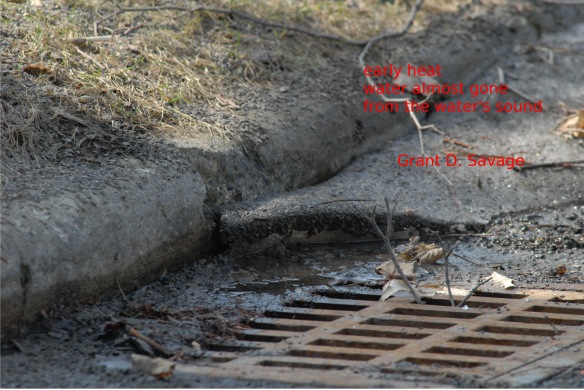Shahai by Grant D. Savage: early heat/ water almost gone/ from the water’s sound
from Michael Dylan Welch’s NaHaiWriMo via facebook:
Did you know that, by definition, a haiga must contain a painting (not a photo), and calligraphy of a haiku done by hand (not words typed using a computer)? That’s what purists will say, but of course photo-haiga is a wonderful modern development of the haiga tradition. The Japanese term for photo-haiga is shahai. This term isn’t widely known in English, but it might be worth remembering if you enjoy making haiga or photo-haiga. For more information on haiga, and a selection of my own haiga (done with various artists) and photo-haiga, please visit http://sites.google.com/site/graceguts/haiga.
Grant already knew of the distinction.
An excerpt from a paper on John Wills, haiku poet, read by Grant D. Savage at the Tree Reading series, March 13, 2012. It gives some idea of the depth possible in a single haiku:
From the ‘The Fields’ section of ‘Reed Shadows’ by John Wills:
the rocky den
of the copperhead
hepatica
Sound devices, conscious, unconscious, and accidental, play a large role in the haiku form simply because of its brevity, and quickly either strengthen or weaken individual efforts. In this copperhead poem, the assonance of the short short ‘e’s and and to a lesser extent the short ‘o’s runs throughout the haiku, and along with the alliteration of k, p and d sounds, emphasizes the suddenness, hardness, and sharp nature of the rock, and potentially, of the copperhead.
The juxtaposition of the darkness, camouflage, and hidden danger, with the softness of the white, early spring flowers, their reaching for the sun, while both the flower and the possibly coiled or striking snake, are both close to the cool, damp, ground, yet dependent on spring sun and warmth.
This is the unstated subject matter of this haiku, all this, along with the somewhat cacophonous music of the sound devices.
My note: You can still get used copies of ‘Reed Shadows’, selected haiku of John Wills edited by Rod Willmot, (Montreal) and published both by Burnt Lake Press and Black Moss Press. Amazon, for example, listed two: one paperback for $189.00 and one with an ‘unknown binding’ for $19.67, though Alibris had one for around $20.
Angela Leuck, our guest for the winter 2012 KaDo meeting, is getting married in June and sends this haiku from China, where she teaches.
magpie flicks his tail–
I add a train
to my wedding gown
Posted in the above/ground press blog, an interview rob mclennan and Pearl Pirie, our own personal haiku poet and literary blogger.
Go to: networkblogs.com/vDaPS
Click on Some author activity: Pirie, Armantrout, Ladouceur, Earl and Kroetsch, as all authors are worth reading. Armantrout read at Versefest 2012, and Ben Ladouceur is an Ottawa/Carleton U poet.
A note from Janick Belleau in Montreal: …(I) just came back from 11 days in Paris, participating to the Salon du Livre where Japanese litereature was the guest, to launch a Haiku book (3 voices of women amongst them, mine), gave lectures in La Rochelle and a communication on tanka in Puteaux (near Paris). What a great 11 days Janick!
Go to haikuchronicles.com for some exciting crossover adventures. Destination HAIGA. Donna, Al and Anita Virgil (all excetional haiku/senryu poets) have packed classical and contemporary haiku, senryu and tanka with striking visual accompaniments — many with a twist. Haiku Chronicles is a non-profit, free educational poetry podcast. Just click on each episode. Get on board for an exciting trip!
From Ron Silliman, Silliman’s blog, May 14, 2012:
So it’s not a surprise particularly to discover that there is a lot of excellent writing to be found in an anthology like Haiku 21: An Anthology of Contemporary English-Language Haiku, edited by Lee Gurga & Scott Metz, published by Modern Haiku Press of Lincoln, IL.
Some of the poems here, such as Marlene Mountain’s
out of nowhere isn’t
are as good as anything I’ve read this century, regardless of genre.
One last quote Quote from Jorge Luis Borges
A poet never rests. He’s always working, even when he dreams. Besides, the life of a writer, is a lonely one.

